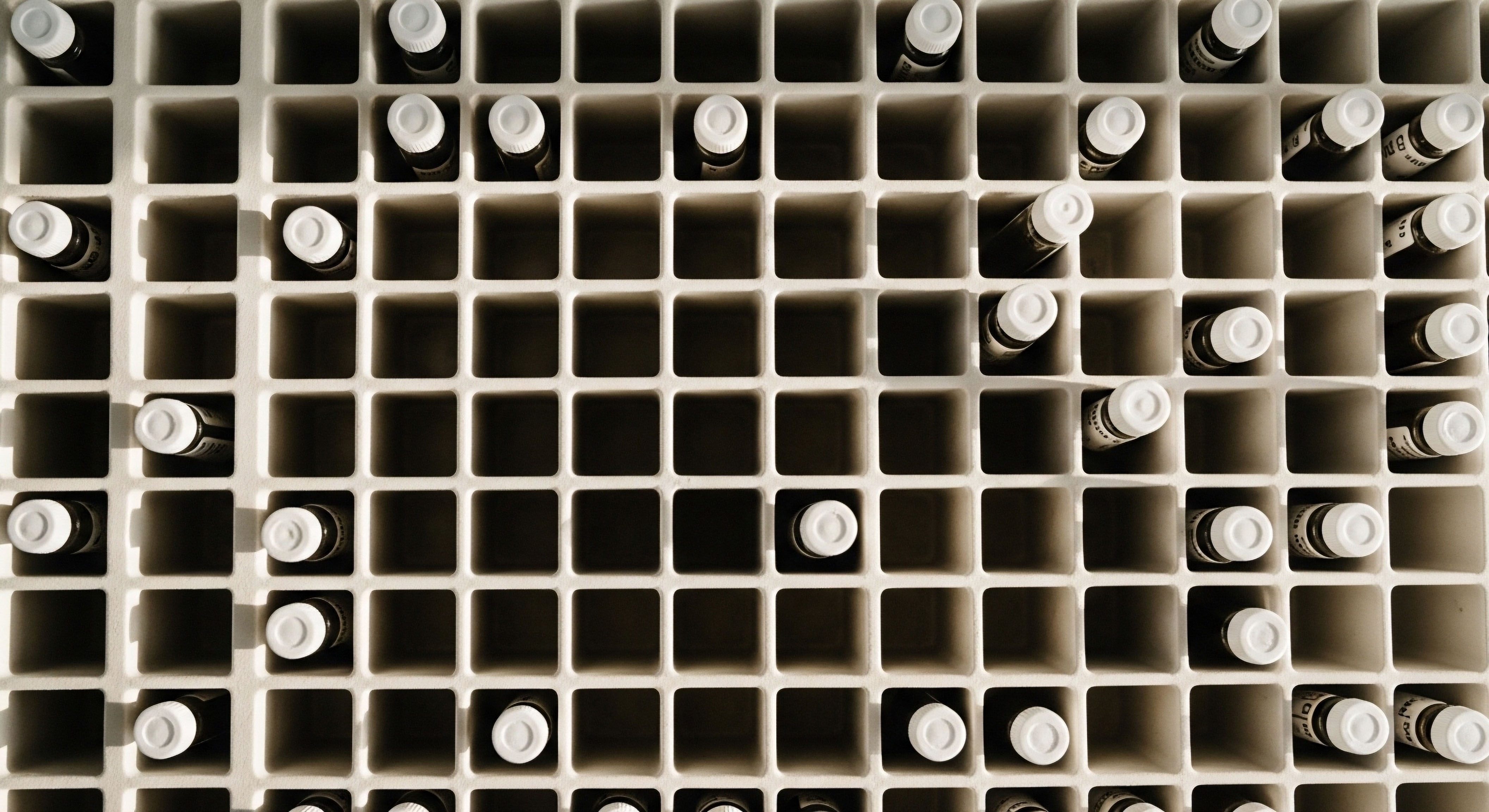

Decoding Your Youthful Chemistry
The pursuit of sustained vitality transcends superficial remedies. It demands a profound understanding of the body’s internal architecture. We often consider rest a passive state, a mere cessation of activity. A more precise view positions optimized rest as a foundational, active process. This biological intervention orchestrates cellular repair and hormonal recalibration, directly influencing our capacity for peak performance and extended youthfulness.
Aging manifests as a decline in cellular efficiency and hormonal balance. The endocrine system, a complex network of glands, governs nearly every physiological process. Hormones like growth hormone, testosterone, and cortisol dictate our metabolic rate, muscle synthesis, cognitive function, and even mood. Optimal rest directly impacts the rhythmic secretion of these vital chemical messengers.
Disrupted sleep patterns, for example, suppress growth hormone release, diminishing tissue repair and fat metabolism. Chronically elevated cortisol, a hallmark of insufficient recovery, accelerates cellular senescence and compromises immune function.
Sustained sleep deprivation reduces insulin sensitivity by up to 40%, elevating the risk of metabolic dysfunction.
The science points to specific biological pathways. During deep sleep stages, the brain engages in a rigorous cleansing process, the glymphatic system actively removing metabolic waste products. This nightly detoxification preserves neuronal integrity and supports cognitive acuity. A compromised glymphatic system correlates with accelerated neurodegenerative processes.
Our cellular machinery also undergoes critical maintenance cycles during periods of reduced external stimuli. DNA repair mechanisms activate, mitochondria regenerate, and protein synthesis accelerates. These are not incidental occurrences; they represent a scheduled, systemic overhaul.
Consider the impact on performance metrics. Athletes recognize recovery as a performance multiplier. Studies consistently link adequate rest to improved reaction times, enhanced strength gains, and superior endurance. Beyond physical prowess, cognitive performance experiences a significant uplift. Memory consolidation, problem-solving capabilities, and emotional regulation all depend heavily on the quality and duration of restorative periods. Optimized rest represents a strategic advantage, a deliberate choice to fortify the body’s intrinsic capacity for renewal.
The body’s repair systems possess a remarkable capacity for self-renewal. This intrinsic ability, however, demands specific conditions for its activation and execution. Disregarding these conditions invites accelerated biological decline. We possess the tools to influence this internal environment, shaping our long-term health trajectory.


Protocols for Biological Regeneration
Achieving optimized rest involves a precise orchestration of environmental controls and physiological signals. This extends far beyond simply spending hours in bed. It demands a systems-level approach, influencing light exposure, temperature regulation, nutrient timing, and even targeted biochemical support. We shape our internal state through deliberate external inputs.

Mastering the Circadian Rhythm
The circadian clock, our internal 24-hour timekeeper, governs sleep-wake cycles and hormonal secretion. Light exposure serves as its primary synchronizer. Morning sunlight exposure, specifically within the first hour of waking, signals the brain to suppress melatonin production and initiate cortisol release. This primes the body for wakefulness and activity. Conversely, minimizing artificial light exposure, especially blue light, in the evening preserves melatonin secretion, facilitating sleep onset. Implementing a strict light hygiene protocol becomes paramount.
- Morning Light ∞ Seek 10-30 minutes of natural light within an hour of waking.
- Evening Darkness ∞ Dim ambient lights 2-3 hours before sleep.
- Blue Light Filters ∞ Utilize blue light blocking glasses or screen filters after sunset.

Thermal Regulation for Deep Sleep
Core body temperature naturally drops in the evening, a physiological signal for sleep initiation. Creating a cool sleep environment enhances this process. An optimal bedroom temperature typically ranges between 60-67 degrees Fahrenheit (15-19 degrees Celsius). This facilitates quicker sleep onset and promotes deeper, more restorative sleep stages. Cooling the body before sleep, perhaps with a lukewarm shower, can also aid in this thermal transition.

Nutrient Timing and Recovery Substrates
Dietary choices profoundly impact sleep architecture and recovery processes. Consuming a nutrient-dense diet rich in complex carbohydrates, healthy fats, and adequate protein supports neurotransmitter synthesis and blood sugar stability. Specific micronutrients, magnesium and zinc, play direct roles in sleep regulation. Avoiding heavy meals and stimulants, such as caffeine and alcohol, close to bedtime prevents digestive distress and neurological overstimulation.
Certain supplements act as powerful adjuncts. Glycine, an amino acid, promotes deeper sleep and reduces core body temperature. Apigenin, a flavonoid, offers calming effects without sedation. Magnesium L-threonate, a specific form of magnesium, crosses the blood-brain barrier, enhancing sleep quality and cognitive function. These agents do not induce sleep; they optimize the body’s natural mechanisms.
A meta-analysis revealed a 30% improvement in sleep efficiency with magnesium supplementation in individuals with sleep disturbances.

Advanced Modalities for Restoration
Beyond fundamental practices, advanced strategies accelerate biological regeneration. Cold exposure, through cold showers or ice baths, reduces inflammation and activates brown adipose tissue, enhancing metabolic flexibility. Sauna therapy, conversely, induces heat shock proteins, promoting cellular repair and detoxification. Targeted peptide therapies, such as BPC-157, offer precise support for tissue repair and gut health, directly contributing to systemic recovery. These modalities represent a deliberate investment in cellular longevity.


The Rhythmic Science of Sustained Vitality
Integrating optimized rest protocols into a high-performance lifestyle demands consistency and a data-driven approach. The benefits accumulate over time, manifesting as tangible improvements in physical, mental, and emotional resilience. This represents a long-term commitment to biological excellence, not a temporary fix.

Consistent Timing for Hormonal Synchronization
Maintaining a consistent sleep-wake schedule, even on weekends, reinforces the circadian rhythm. This predictability allows the endocrine system to synchronize hormone release, ensuring optimal levels of cortisol in the morning and melatonin in the evening. Erratic schedules disrupt this delicate balance, leading to chronic fatigue and hormonal dysregulation. Precision in timing yields predictable, powerful results.

Measuring Your Biological Gains
The impact of optimized rest extends beyond subjective feeling. Objective metrics validate the efficacy of these protocols. Wearable devices track sleep stages, heart rate variability (HRV), and resting heart rate. HRV, a powerful biomarker of autonomic nervous system function, provides a window into recovery status. Higher HRV values correlate with greater resilience and adaptability. Consistent monitoring allows for iterative adjustments to your recovery regimen, personalizing the approach for maximum benefit.

Interpreting Your Recovery Data
Regularly review sleep data, focusing on deep and REM sleep percentages. Observe trends in your HRV and resting heart rate. A sustained increase in deep sleep, coupled with an elevated HRV, signals effective recovery. Conversely, suppressed HRV or prolonged periods of light sleep indicate a need for further optimization. This data empowers informed decision-making regarding training intensity, nutritional strategies, and stress management.

Sustaining Peak Performance
The objective is a continuous state of high function and biological resilience. Optimized rest transforms recovery from a passive necessity into an active component of your daily strategy. This proactive stance guards against age-related decline, extending the period of peak physical and cognitive output. The body becomes a finely tuned instrument, capable of responding with precision and power to life’s demands.
This commitment transcends the conventional understanding of aging. It establishes a new standard for human potential, demonstrating that the trajectory of vitality lies within our influence. The sustained application of these principles reshapes our biological destiny.

Beyond the Limits of Age
The paradigm shift surrounding rest fundamentally alters our relationship with time and performance. We cease to accept biological decline as an inevitability. Instead, we recognize it as a challenge amenable to intelligent, scientific intervention. The conscious cultivation of restorative states becomes the ultimate act of self-sovereignty, a declaration of intent to live at the zenith of human capability.
This journey is a deliberate construction of a future defined by enduring vigor and clarity, a future where youthfulness extends through strategic biological mastery. We define our own prime.



